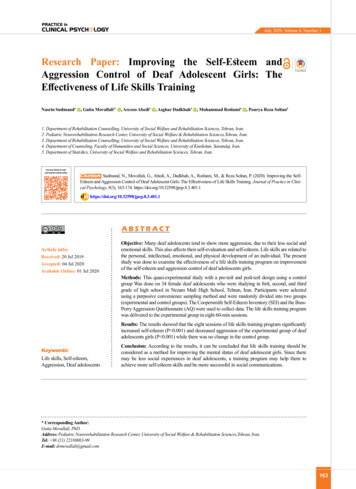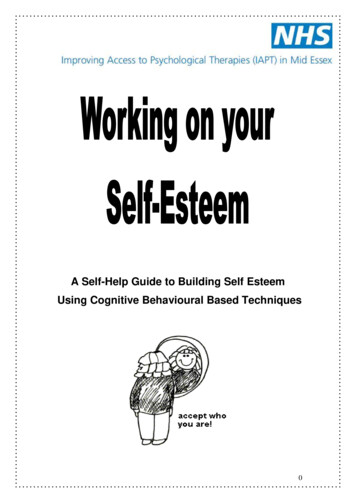
Transcription
Improving your Self-esteemHow to improve yourVitality, Energy,Persistence andPersonal MagnetismDavid Jackson
Improving your Self-EsteemDavid Jackson CSPSince 1985, David has spoken professionally in many countries of the world including USA,England, New Zealand, Malaysia, Samoa and Taiwan.David is a motivated enthusiastic believer in people and their natural ability to improve andenjoy more of what they now do. He has a passion for what calls “Level 10” living.He has shared his optimistic message with over 250,000 people at all levels and in over 20different industries. He is known as the” Sales Doctor “.David’s message is simple – “You are what you wish to become”.Your people will be enriched by his words and his success game plans. He is alsocommitted to his profession.David is a Certified Speaking Professional with the Professional Speakers Association ofAustralia and The National Speakers Association in America. Having produced andwritten over 9 Best Selling DVD programs plus numerous eBooks on Sales andCommunication Skills. More recently, David has become a Fellow of the Institute forLearning Professionals.David has been involved in sales and marketing for over 30 years, and delivers a grass rootscredible message gained from personal experience.David is sincere, humorous and energetic. He succeeds in getting audience participation inhis workshop experiences whilst enjoying the process and putting FUN back into work.He will enhance your organisation’s prime resource – your people, taking them to the nextlevel.David Jackson CSP – Speaker Sales Coach AuthorPh: 61 403 102 000 Email: david@davidjackson.com.auwww.davidjackson.com.au PO Box 381, Rose Bay NSW 20292 Page
Improving your Self-EsteemTerms and ConditionsLEGAL NOTICEThe Publisher has strived to be as accurate and complete as possible in the creation of thiseBook, notwithstanding the fact that he does not warrant or represent at any time that thecontents within are accurate due to the rapidly changing nature of the Internet.While all attempts have been made to verify information provided in this eBook, thePublisher assumes no responsibility for errors, omissions, or contrary interpretation of thesubject matter herein. Any perceived slights of specific persons, peoples, or organisationsare unintentional.In practical advice eBook, like anything else in life, there are no guarantees of income made.Readers are cautioned to reply on their own judgment about their individual circumstancesto act accordingly.This eBook is not intended for use as a source of legal, business, accounting or financialadvice. All readers are advised to seek services of competent professionals in legal,business, accounting and finance fields.You are encouraged to print this eBook for easy reading.Improving Your Self-esteemCopyright 2020 VFC by David JacksonAll rights reserved.No part of this publication may be reproduced, distributed or transmitted in any form or by any means,including photocopying, recording, or other electronic or mechanical methods, without the prior writtenpermission of the author, except in the case of brief quotations.3 Page
Improving your Self-EsteemContentsCHAPTER 1: INTRODUCTION . 5CHAPTER 2: WHERE DOES OUR SELF-ESTEEM COME FROM?. 7CHAPTER 3: WHAT IS SELF-ESTEEM? . 8CHAPTER 4: DO I HAVE LOW SELF-ESTEEM? . 11CHAPTER 5: THE INNER VOICE . 16CHAPTER 6: POSITIVE AFFIRMATIONS . 19CHAPTER 7: SELF-NURTURING . 24CHAPTER 8: CALLING OUT “THE TROOPS” . 26CHAPTER 9: POSITIVE SELF-TALK – I CAN, AM I WILL! . 27CHAPTER 10: YOUR ENVIRONMENT. 30CHAPTER 11: KIDS AND IMPROVING THEIR SELF-ESTEEM . 35CHAPTER 12: COPING WITH CRITICISM . 39CHAPTER 13: QUICK START GUIDE 25 TIPS . 41CHAPTER 14: CONCLUSION. 45ACTION PLAN . 48Thoughts and Comments . 49Thank You . 50“The Sales Doctor” . 504 Page
Improving your Self-EsteemCHAPTER 1: INTRODUCTIONQuestion: Want to improve your self-esteem in order to lead a more fulfilled andhappier life?We can show you how to improve your self-esteem in just one weekend! Three shortdays where you will apply what this eBook will show you and that will stay with youas your life becomes the bright place it should be.Esteem is a simple word. It is the worth and value that we apply to people, places, andsituations. It is the amount of respect we assess. We have esteem for our world leaders.We have esteem for places like church and synagogue. We have esteem for anexemplary performance whether it is in sports, acting, or simply doing the right thing.But the most important place we need to apply esteem is within ourselves. We mustmaintain our self-esteem in order to place value on ourselves as a worthy individual inthe world. Self-esteem can affect every single part of our lives. If that esteem is low,our lives will be dull and grey. Elevating esteem for ourselves could very well be thekey to happiness in life.Most people's feelings and thoughts about themselves fluctuate somewhat based ontheir daily experiences. The grade you get on an exam, how your friends treat you, upsand downs in a romantic relationship-all can have a temporary impact on yourwellbeing.Your own self-esteem, however, is something more fundamental than the normal "upsand downs" associated with situational changes. For people with good basic selfesteem, normal "ups and downs" may lead to temporary fluctuations in how they feelabout themselves, but only to a limited extent. In contrast, for people with poor basicself-esteem, these "ups and downs" may make all the difference in the world.People with poor self-esteem often rely on how they are doing in the present todetermine how they feel about themselves. They need positive external experiences tocounteract the negative feelings and thoughts that constantly plague them. Even then,the good feeling (from a good grade, etc.) can be temporary.Healthy self-esteem is based on our ability to assess ourselves accurately (knowourselves) and still be able to accept and to value ourselves unconditionally. This meansbeing able to realistically acknowledge our strengths and limitations (which is part of5 Page
Improving your Self-Esteembeing human) and at the same time accepting ourselves as worthy and worthwhilewithout conditions or reservations.What we want to do is help you raise your self-esteem to levels that will enhance yourlife and the way you view life. It can make a tremendous difference in your quality oflife. Learning techniques to raise self-esteem can be taught and put into practice in justa few days. However, it will take practice to keep your self-worth at the forefront.Please read on 6 Page
Improving your Self-EsteemCHAPTER 2: WHERE DOES OUR SELF-ESTEEMCOME FROM?Our self-esteem develops and evolves throughout our lives as we build an image of ourselvesthrough our experiences with different people and activities. Experiences during our childhoodplay a particularly large role in the shaping of our basic self-esteem.When we were growing up, our successes (and failures) and how we were treated by themembers of our immediate family, by our teachers, coaches, religious authorities, and by ourpeers, all contributed to the creation of our basic self-esteem.An adult who has healthy self-esteem was given this gift in childhood. This could have beendone in many ways. Probably one of the most important is being praised for accomplishments.Children who are talked to respectfully and listened to also contributed to healthy self-esteemin adulthood. These children were hugged often and given attention and experienced sometype of success in school or sporting activities or other activities.On the other side of the spectrum, we have to identify the childhood for those adults who havepoor self-esteem. These children were often criticized harshly, were yelled at or beaten, andwere given little attention by those they were closest to. They were ridiculed and even teasedas they experienced failures in their young lives. They were made to feel they had to be perfectin order to be valued and associated failure in situations as a failure of their whole selves.It’s sad, isn’t it? To think of a child treated that way. What’s even sadder is the effect thattreatment has on their lives as adults. We are shaped and moulded by our experiences. Do yourecognize yourself?How we feel about ourselves can influence how we live our lives. People who feel that they arelikable and lovable (in other words people with good self-esteem) have better relationships.They are more likely to ask for help and support from friends and family when they need it.People who believe they can accomplish goals and solve problems are more likely to do well inschool. Having good self-esteem allows you to accept yourself and live life to the fullest.Self-esteem plays a role in almost everything we do. People with high self-esteem do better inschool and find it easier to make friends. They tend to have better relationships with peers andadults, feel happier, find it easier to deal with mistakes, disappointments, and failures, and aremore likely to stick with something until they succeed. It takes some work, but it's a skill you'llhave for life.This eBook is about how to raise your self-esteem, so we will focus on the low self-esteem thatmany people have these days. You can overcome issues with low self-esteem. It’s not asdifficult as you might think. In fact, all you have to do is recognize, understand, and use thetechniques we will give you.One of the initial questions we feel compelled to address is what exactly self-esteem is.7 Page
Improving your Self-EsteemCHAPTER 3: WHAT IS SELF-ESTEEM?Some people think that self-esteem means confidence - and of course confidence comesinto it – although it's rather more than that.The fact is that there are any number of apparently confident people who can domarvelous things but who have poor self-esteem. Many people in the public eye fallinto this category. Actors and comedians and singers in particular can seem to glowwith assurance 'on stage', and yet off-stage many of them feel desperately insecure.Indeed, individuals can be stunningly attractive and world-famous, and seem poisedand perfect - yet still, deep down, find it hard to value themselves. Think of the latePrincess of Wales, Michael Jackson and Marilyn Monroe and you'll accept, I think, thatpublic adulation is no guarantee of self-belief.So, if self-esteem isn't quite the same thing as confidence, what is it?Well, the word 'esteem' comes from a Latin word which means 'to estimate'. So, selfesteem is how you estimate yourself.To do that you need to ask yourself certain questions: Do I like myself? Do I think I'm a good human being? Am I someone deserving of love? Do I deserve happiness? Do I really feel - both in my mind and deep in my guts - that I'm an OK person?People with low self-esteem find it hard to answer 'yes' to these questions. Perhaps youare one of them. If you’re reading this eBook, we think you are. Don’t despair. Justread on!The concept of self-esteem can be summed up as: Confidence in our ability to thinkand in our ability to cope with the basic challenges of life and confidence in our right tobe successful and happy, the feelings of being worthy, deserving, entitled to assert ourneeds and wants, achieve our values and enjoy the fruits of our efforts.We also commonly think that self-esteem is merely about how we feel about ourselvesat any particular moment. While seemingly existing in degrees, we tend to believe that8 Page
Improving your Self-Esteemwe have positive or negative self-esteem and that we make that determination simplyby how we feel about ourselves.However, our feelings or emotions do not exist alone or have an independent existence.We do not just simply feel. Rather, for every feeling or emotion that we have, eitherpositive or negative, there is a corresponding thought that we have about ourselves thatgenerates the experience of self-esteem.Whether positive or negative, self-esteem is merely how our psyche experiences thethoughts that we have about ourselves. If a person has positive thoughts aboutthemselves they will experience positive or good self-esteem. On the other hand, if theindividual has negative thoughts about whom they think they are then they willexperience poor or negative self-esteem.Therefore, to truly understand what self-esteem is all about and more importantly to beable to alter it when necessary for ones wellness or healing, we must first get it that selfesteem is really about our thinking, and more specifically about the thoughts that wedevelop or create about ourselves. The thoughts or beliefs that we have about ourselvesare crucial in that they determine or create the structure of our experience of selfesteem and the various emotions associated with it.We also tend to think of our self-esteem as being something that is shaped by theevents that take place in our life, particularly those from our past. We tend to believethat who we think we are and how we feel about ourselves is merely the product, effector caused by the experiences that we have had in the past – it says that we are who weare by virtue of what has happened to us as human beings.More specifically, we tend to think that the cause in the matter of whom we think weare and our self-esteem is due to circumstance, situation or others, people, places andthings. We do not tend to think that our self-esteem is something we actuallydeveloped or created. Our personal self-esteem is shaped by our past and theexperiences we have had in our lives.We created our thoughts and with it our emotions from the meaning that we gave to theevents that took place in our life, especially at an early age. We give meaning toeverything in our life including and most importantly to ourselves. At an early age themeaning that we give an event tends to be made out to be all about us. While events dohappen it is not the events that are important but rather the meaning that we give themand especially how we made it out to be about our identity.9 Page
Improving your Self-EsteemLiving in a state of low self esteem can be very damaging to the quality of life you leadon a daily basis. Your self esteem is YOUR opinion of yourself, but far too many peopleallow others to influence or even make up their opinion for them. It sounds so verysilly, but if you think on this you will realize how certain events, comments andencounters helped to "make or break" your self esteem.Let’s look at some indicators that show you might have low self-esteem.10 P a g e
Improving your Self-EsteemCHAPTER 4: DO I HAVE LOW SELF-ESTEEM?While you might already have a good indication that you are suffering from low selfesteem, it might be a good idea to explore this a little further. Take this simpleassessment.Self-esteem AssessmentDirections: Circle the correct Answer T if the statement is true for you. Answer F if the statement is falsefor you.T FI am able to discuss my good points, skills, abilities,achievements, and successes with others.T FI assert myself with someone whom I believe isviolating or ignoring my rights.T FI am content with who I am, how I act, and what Ido in life.T FI am not bothered by feelings of insecurity or anxietywhen I meet people for the first time.T FMy life is balanced between work, family life, sociallife, recreation/leisure, and spiritual life.T FI am aware of the roles I played in my family oforigin and have usually been able to make thesebehavior patterns work for me in my current life.T FI am bonded with the significant others inmy environment at home, work, school, at play, or inthe community.T FI am able to perform the developmental tasksnecessary to ensure my ongoing healthy self-esteem.T FI am satisfied with my level of achievement atschool, work, home, and in the community.T FI am a good problem solver; my thinking is notclouded by irrational beliefs or fears.T FI am willing to experience conflict, if necessaryto protect my rights.11 P a g e
Improving your Self-EsteemIf you selected F for three or more of the preceding questions, you probably need to workat increasing your self-esteem. That’s what we’re here for! But that comes a little later!There are many, many indicators that a person has low self-esteem. Consider this list.People with low self-esteem: Consider themselves lost, unworthy of being cared forAre poor risk takersOperate out of a fear of rejectionAre typically unassertive in their behavior with othersAre fearful of conflict with othersAre hungry for the approval of othersAre poor problem solversAre fraught with irrational beliefs and have a tendency to think irrationallyAre susceptible to all kinds of fearsHave a tendency to become emotionally stuck and immobilizedHave a poor "track record" in school or on the job; conversely, they sometimes overcompensate and become over-achieversAre unable to affirm or to reinforce themselves positivelyAre unable to make an honest assessment of their strengths, qualities, and good points;they find it difficult to accept compliments or recognition from othersHave poorly defined self-identities with a tendency to be chameleons in order to fit inwith othersAre insecure, anxious, and nervous when they are with othersOften become overcome with anger about their status in life and are likely to havechronic hostility or chronic depressionAre easily overcome with despair and depression when they experience a setback orloss in their livesHave a tendency to overreact and become de-energized by resentment, anger, and thedesire for revenge against those whom they believe have not fully accepted themFulfill roles in their families of origin that are counter-productive and maladaptive.These roles carry over into their adult livesAre vulnerable to mental health problems and have a propensity to use addictivebehavior to medicate their hurt and pain. Such addictive behavior can include alcohol,drugs, food, gambling, sex, shopping, smoking, working too much, or the search forexcitement, truth, wisdom, and a guru with an easy guide to the achievement ofhappiness12 P a g e
Improving your Self-EsteemKind of overwhelming, isn’t it? Do you recognize yourself in any of these statements?Don’t feel alone. Actually, low self-esteem is actually quite a widespread problem.And if you suffer from this problem, it can cause some more – even serious – problems.Low self-esteem can have devastating consequences. It can create anxiety, stress, loneliness and increased likelihood for depression. It can cause problems with friendships and relationships. It can seriously impair academic and job performance. It can lead to underachievement and increased vulnerability to drug and alcoholabuse.Worst of all, these negative consequences themselves reinforce the negative self-imageand can take a person into a downward spiral of lower and lower self-esteem andincreasingly non-productive or even actively self-destructive behavior.There are actually three “faces” that people with low self-esteem wear. See if you seeyourself in any of these personalities.The Impostor: acts happy and successful, but is really terrified of failure. The imposterlives with the constant fear that she or he will be "found out." They need continuoussuccesses to maintain the mask of positive self-esteem, which may lead to problemswith perfectionism, procrastination, competition, and burn-out.The Rebel: acts like the opinions or good will of others - especially people who areimportant or powerful - don't matter. The rebel lives with constant anger about notfeeling "good enough." They continuously need to prove that others' judgments andcriticisms don't hurt, which may lead to problems like blaming others excessively,breaking rules or laws, or fighting authority.The Victim: acts helpless and unable to cope with the world and waits for someone tocome to the rescue. The victim uses self-pity or indifference as a shield against fear oftaking responsibility for changing his or her life. They look constantly to others forguidance, which can lead to such problems as lacking assertiveness skills, underachievement, and excessive reliance on others in relationships.13 P a g e
Improving your Self-EsteemSO WHAT DOES A PERSON WITH HEALTHY SELF-ESTEEM LOOK LIKE?These people exhibit the following qualities. Hold themselves as worthy to be loved and to love others, worthy to be cared forand to care for others, worthy to be nurtured and to nurture others, worthy to betouched and supported and to touch and support others, worthy to be listened toand to listen to others, worthy to be recognized and to recognize others, worthy tobe encouraged and to encourage others, worthy to be reinforced as "good" peopleand to recognize others as "good" people. Have a productive personality; they have achieved success to the best of theirability in school, work, and society. Are capable of being creative, imaginative problem solvers; of being risk takers,optimistic in their approach to life and in the attainment of their personal goals. Are leaders and are skillful in dealing with people. They are neither tooindependent nor too dependent on others. They have the ability to size up arelationship and adjust to the demands of the interaction. Have a healthy self-concept. Their perception of themselves is in synchrony withthe pictures of themselves they project to others. Are able to state clearly who they are, what their future potential is, and to whatthey are committed in life. They are able to declare what they deserve to receive intheir lifetime. Are able to accept the responsibility for and consequences of their actions. Theydo not resort to shifting the blame or using others as scapegoats for actions thathave resulted in a negative outcome. Are altruistic. They have a legitimate concern for the welfare of others. They arenot self-centred or egotistical in their outlook on life. They do not take on theresponsibility for others in an over-responsible way. They help others accept theresponsibility for their own actions. They are; however, always ready to helpanyone who legitimately needs assistance or guidance. Have healthy coping skills. They are able to handle the stresses in their lives in aproductive way. They are able to put the problems, concerns, issues, and conflictsthat come their way into perspective. They are able to keep their lives inperspective without becoming too idealistic or too morose. They are survivors in14 P a g e
Improving your Self-Esteemthe healthiest sense of the word. They have a good sense of humor and are able tokeep a balance of work and fun in their lives. Look to the future with excitement, a sense of adventure and optimism. Theyrecognize their potential for success and visualize their success in the future. Theyhave dreams, aspirations, and hopes for the future. They are goal-oriented with a sense of balance in working toward their goals.They know from where they have come, where they are now, and where they aregoing.Does this sound like someone you want to be like?Well, it can be! There are so many steps you can take to raise your self-worth and stopsuffering from low self-esteem.You will be a much better person for it and enjoy a wonderfully fulfilling life.The first point we need to address is your inner voice.Please read on 15 P a g e
Improving your Self-EsteemCHAPTER 5: THE INNER VOICEOur past experiences, even the things we don't usually think about, are all alive andactive in our daily life in the form of an inner voice. Although most people do not "hear"this voice in the same way they would a spoken one, in many ways it acts in a similarway, constantly repeating those original messages to us.For people with healthy self-esteem the messages of the inner voice are positive andreassuring. For people with low self-esteem, the inner voice becomes a harsh innercritic, constantly criticizing, punishing, and belittling their accomplishments.Do you ever find yourself berating yourself for something that you’ve done? Have youever found yourself struggling with something that you know you should do but keeptalking yourself out of? That’s your inner voice.Your inner voice will say things like, “You can’t do this”, “There’s no way you cansucceed”, and “Why bother trying, you’ll just fail”. Your inner voice is your harshestcritic and the one who will lower your self-esteem the quickest. You need to change thatinner voice from a negative influence to a positive one. We code named the negativeInner Voice – “The Ghost”.We all have an inner voice (The Ghost). You should talk back to it. Combat it. Let itknow that YOU are the one in control, not it! Let’s look at some of the dialogue the innervoice will tell you and healthy ways to rebut what it is saying.When the inner voice (The Ghost). is unfairly harsh:"People said they liked my presentation, but it was nowhere near as good as it should have been.I can't believe no-one noticed all the places I messed up. I'm such an impostor."Counteract by being reassuring yourself:"Wow, they really liked it! Maybe it wasn't perfect, but I worked hard on that presentation anddid a good job. I'm proud of myself. This was a great success."If the inner voice is unrealistically generalizing as in:"I got an F on the test. I don't understand anything in this class. I'm such an idiot. Who am Ifooling? I shouldn't be taking this class. I'm stupid and I don't belong in college."Tell that inner voice something specific:16 P a g e
Improving your Self-Esteem"I did poorly on this one test, but I've done O.K. on all the homework. There are some thingshere that I don't understand as well as I thought I did, but I can do the material-I've done fine inother classes that were just as tough.”The inner voice might also be extremely illogical."He is frowning. He didn't say anything, but I know it means that he doesn't like me!"Tell that voice something that is purely logical."O.K., he's frowning, but I don't know why. It could have nothing to do with me. Maybe Ishould ask." Finally, the inner voice will take things to extremes."She turned me down for a date! I'm so embarrassed and humiliated. No one likes orcares about me. I'll never find a girlfriend. I'll always be alone."It’s time to tell that inner voice things aren’t nearly as bad as they make them out to be."Ouch! That hurt. Well, she doesn't want to go out with me. That doesn't mean no one does. Iknow I'm an attractive and nice person. I'll find someone."In general, when that inner voice begins putting you down, counteract with a positivestatement or affirmation. Don’t let that voice overtake you and talk you into somethingthat just isn’t true. You are in control – not the inner critic. Take charge and begin thejourney toward more positive thinking!One way to do this is through positive affirmations. This isn’t new-age anything, it’ssimply a way for you to infuse positive self-talk into your life and calm that negativeinner voice.Utilizing positive affirmations can be a very powerful tool for transforming what aperson thinks about themselves and as a result improve the individual’s self-esteem.Consistent use of positive affirmations will transform the negative beliefs about who aperson thinks he or she is into positive ones, will begin to alter the basis and structure ofhis or her self-talk or inner voice and produce a transformation from poor self-esteemto positive self-esteem.While utilized in a various ways, working with positive affirmations will be moreeffective when delivered through or combined with therapeutic relaxation music. Whattherapeutic relaxation music does to enhance the effect of positive affirmations is tocreate a very relaxed audio environment for the individual to become even more openor suggestive to the language of positive affirmations.17 P a g e
Improving your Self-EsteemWhen you use music while telling yourself positive affirmations, you will be morerelaxed and more open to accepting the positive comments you are telling yourself.We found a wonderful music on Spotify/iTunes that helps to calm the soul and transformnegative thoughts into positive thoughts. Just look for calming music along with somesoothing background noise like waves crashing on a shore or water that is flowing.The key to the effective use of positive affirmation in this or any other type ofintervention is consistency. The self-image and the negative thoughts about who aperson thinks he or she is that generates his experience of poor or n
Improving your Self-Esteem 7 P a g e CHAPTER 2: WHERE DOES OUR SELF-ESTEEM COME FROM? Our self-esteem develops and evolves throughout our lives as we build an image of ourselves through our experiences with different people and activities. Experiences during our childhood play a particularly large role in the shaping of










